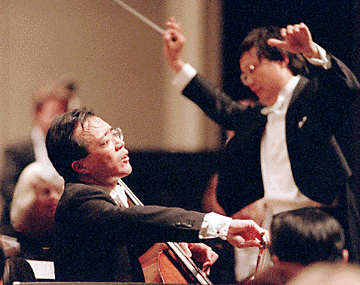


Cellist Ma brilliant
with isle symphonyBy Ruth Bingham
Special to the Star-BulletinHE'S witty, personable, modest, philosophical and a phenomenal cellist.
The Honolulu Symphony's special guest, Yo-Yo Ma, performed Dvorak's Cello Concerto last night to an enthusiastic sold-out crowd.
The concert, which also included Dvorak's Eighth Symphony, celebrated announcing the symphony's 100th anniversary season. Because the concert sold out so quickly, it will be broadcast in full at 8 p.m., March 26, on KHPR 88.1 FM and KKUA 90.7 FM.
Ma, who last performed in Honolulu in 1986, bantered with the audience before the concert.
When introduced, he sent conductor Samuel Wong on stage carrying Ma's cello. The cello, an instrument with amazing tone and resonance, is a 1712 Davidoff Stradivarius. When asked how he decided which cello to use for a concert (he also owns a 1733 Montagnana), he deadpanned, "The one that doesn't reject me."
Actually, he chose his Stradivarius for this concert because of its vibrant tenor, but his offhand comments reveal a philosophical performer. He listens to music, sometimes just a note, over and over "to get what it feels like inside." Noted for his diverse projects and crossover recordings, Ma insists he is not going off in different directions.
"When you keep doing the same thing over and over in different ways, you find different answers," he said.
Ma also offered advice for young musicians. "All endeavor comes at some cost. The more impossible your goal is, the more worth striving for it is."
When playing, "Don't make a sound before you hear it. There's never the perfect sound, but you're always going toward it. Whatever is missing, you work on that."
And how does he practice? "Slowly ... painfully."
Ma places the music -- not himself -- center stage. Time and again, he deflected conversation from himself to talk about the music, and he coughed fakely into his microphone when Executive Director Michael Tiknis attempted to shower praise on him.
These traits were not just preconcert hype: they reverberated throughout Ma's performance, and words pale by comparison.
A riveting presence onstage, Ma played expansively, with pure, uninhibited joy. His wit, vitality, sensitivity and passion reverberated even more than his cello. He did so much more than just make the music sing a rare enough quality -- he lived the music -- mind, body and soul.
His playing in turn inspired everyone to perform at their peak: the orchestra sounded wonderful. Ma did not play with the orchestra in the conventional sense. Rather, his was a prominent musical line among many lines, all dancing together. His emphasis remained on the music, not on himself or his instrument or his technique. Just the music.
Ma's impressive range of nuances, dynamics and expressions makes any discussion of technique irrelevant. His was artistry so artistic as to render the artist (i.e., his ego) inaudible. His long, slender fingers worked magic and miracles with every note.
The evening became less a concert than a communal celebration of the symphony's 100 years, yes, but more so of the music shared in the here and now.
Ma's strong rapport with Conductor Wong and Concertmaster Ignace Jang, for example, converted those marvelous violin-cello duets into intimate trios with the orchestra. That rapport expanded to envelop every musician and member of the audience.
To appease the ardent applause, Ma closed the celebration with a haunting, gently echoing encore, "Appalachia Waltz," by Mark O'Connor.
One final note to celebrate: Ma's grandmother, Mary Tang, was born in Honolulu in 1894, about when the Honolulu Symphony was getting started.
Ma said, "I'm sure she had nothing to do with the Honolulu Symphony, but perhaps if she had heard it, she might have stayed."